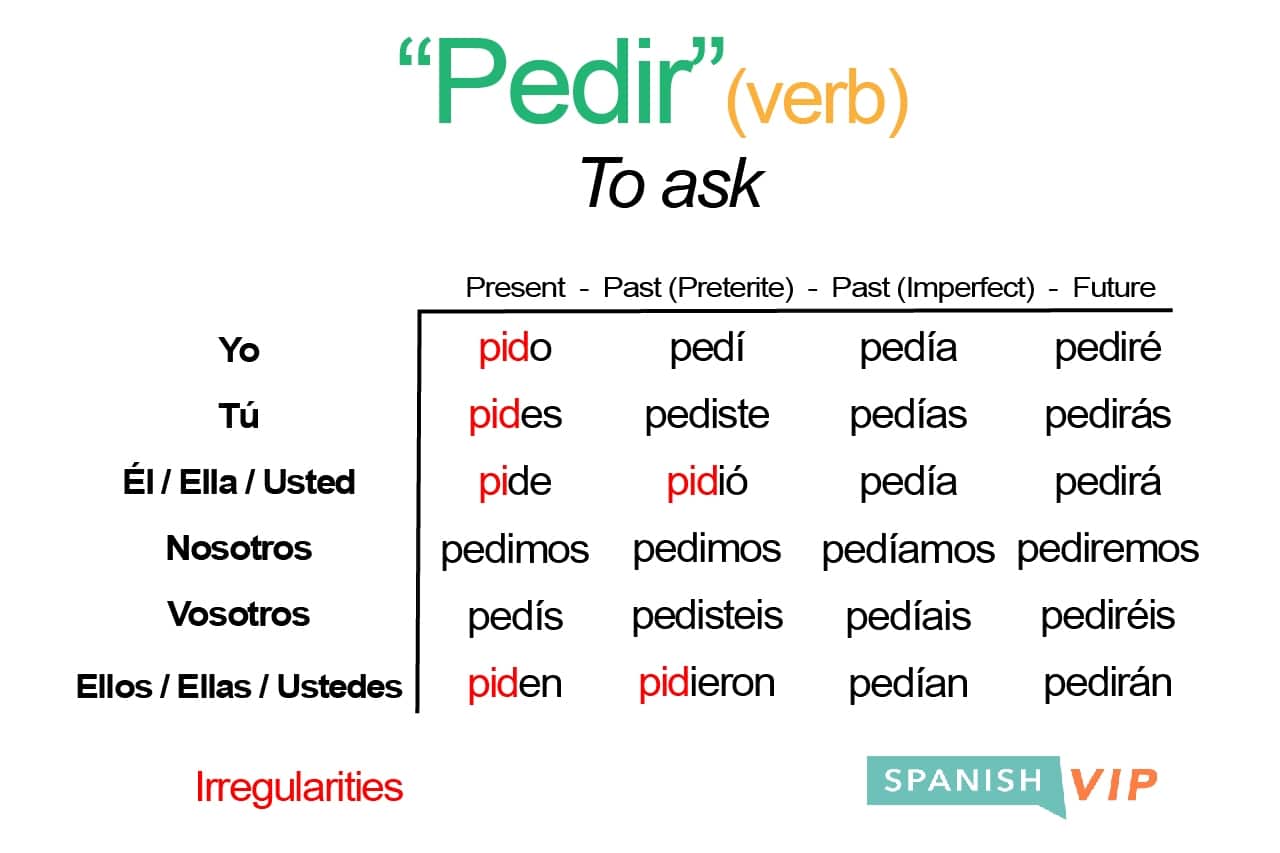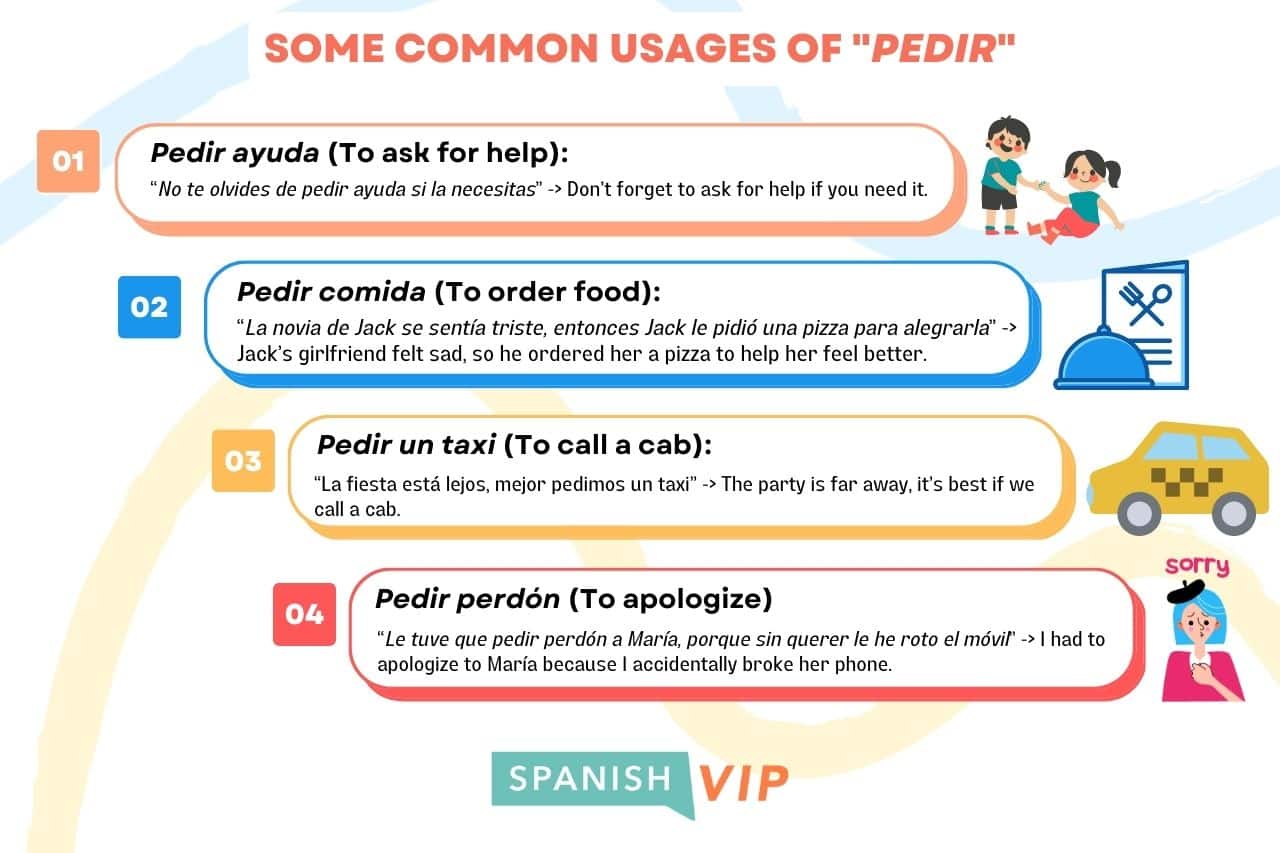
Pedir Conjugation: Spanish Verb Guide
DATE:
Ever wondered how to politely ask for something in Spanish? The verb “pedir” is your go-to for making requests, and it’s used all the time in everyday conversations. But here’s the catch—”pedir” is an irregular verb, which means its conjugation doesn’t always follow the typical patterns you might be familiar with. That’s where things get interesting!
“Pedir” changes in some unexpected ways, especially in the present tense, where it takes on a unique stem change. Understanding how to properly conjugate “pedir” is key to sounding natural and confident when asking for something, whether you’re ordering food, seeking help, or requesting information.
So, what is the conjugation of “pedir”? In the present tense, for instance, it goes like this: yo pido, tú pides, él/ella pide, nosotros pedimos, vosotros pedís, ellos/ellas piden. It’s a bit of a twist, but once you get the hang of it, you’ll find that using “pedir” is not just easy—it’s essential for clear and effective communication in Spanish. Let’s dive deeper into the ins and outs of this important verb, so you can make your requests with confidence!

What is the Spanish Verb Pedir?
In Spanish, “pedir” means “to ask” or “to request”. It is used to express the idea of asking or requesting something from someone else.
“Pedir” is an irregular verb, but only in the present tense “pido“, “pides“, “pide“, “piden“, and the preterite tense, “pidió” and “pidieron”. In other tenses, they follow the same pattern as regular verbs.
Pedir Basic Spanish Verb Conjugation
- Yo pido. (I ask)
- Tú pides. (You ask)
- Él/ella/usted pide. (He/she/you (formal) asks)
- Nosotros/nosotras pedimos. (We ask)
- Vosotros/vosotras pedís. (You (Spain) ask)
- Ellos/ellas/ustedes piden. (They/you (plural, formal) ask)
Other Situations Where You Can Use Pedir
In addition to asking for physical items, the “pedir” can also be used to request other types of things, such as favors, permission, or information. It’s important to understand the different ways in which “pedir” can be used to communicate effectively in Spanish.
- “Pedir permiso” – to ask for permission.
- “Pedir perdón” – to offer apologies or to feel sorry about something.
- “Pedir un deseo” – to make a wish.
- “Pedir ayuda” – to ask for help.
- “Pedir comida” – to ask for food.
- “Pedir un taxi” – to call a taxi.
- “Pedir consejo” – ask for an advise.
- “Pedir matrimonio” – ask for marriage.
Pedir Vs. Preguntar: What Is The Difference?
You might think… “Hey, but isn’t ‘to ask’ the equivalent of ‘preguntar’?” Something important to keep in mind is that “pedir” isn’t the same as “preguntar”.
“Pedir” and “preguntar” are two verbs that often get confused by Spanish learners because they both involve making requests or seeking information. However, they serve different purposes and are used in distinct contexts.
“Pedir” is used when you’re asking for something tangible or intangible, such as a favor, an item, or assistance. For example, “Voy a pedir una pizza” (I’m going to order a pizza) or “Le pedí ayuda a mi amigo” (I asked my friend for help).
On the other hand, “preguntar” is used when you’re asking a question or seeking information. For example, “Voy a preguntar la hora” (I’m going to ask the time) or “Pregunté si el restaurante está abierto” (I asked if the restaurant is open).
In short, use “pedir” when you want something and “preguntar” when you want to know something. Understanding these differences is crucial for clear communication in Spanish.

Pedir Conjugation
Are you eager to learn the “pedir” conjugation like us? We’ll see the complete Spanish conjugation of one of the most important irregular verbs and provide plenty of examples to help you understand how it’s used.
Now, without further ado, let’s get into the real deal and learn how to conjugate “pedir”.
The Indicative Conjugation of Pedir
The indicative form of the Spanish “pedir” conjugation is used to express factual or real situations. It is used to describe what is actually happening or has happened, rather than what might happen or what you wish would happen.
|
Subject |
Present |
Preterite |
Imperfect |
Future |
Conditional |
|---|---|---|---|---|---|
|
Yo |
pido |
pedí |
pedía |
pediré |
pediría |
|
Tú |
pides |
pediste |
pedías |
pedirás |
pedirías |
|
Él, |
pide |
pidió |
pedía |
pedirá |
pediría |
|
Nosotros |
pedimos |
pedimos |
pedíamos |
pediremos |
pediríamos |
|
Vosotras, |
pedís |
pedisteis |
pedíais |
pediréis |
pediríais |
|
Ellos, |
piden |
pidieron |
pedían |
pedirán |
pedirían |
Present tense
- Pido disculpas por llegar tarde a la reunión. – I apologize for arriving late to the meeting.
Preterite tense
- El cliente pidió una ensalada de pollo y una cerveza en el restaurante. – The customer ordered a chicken salad and a beer at the restaurant.
Imperfect tense
- Cada vez que íbamos al parque, mi hermano pequeño siempre pedía un helado. – Every time we went to the park, my little brother always asked for ice cream.
Future tense
- Pediremos un préstamo para comprar un coche nuevo. – We will ask for a loan to buy a new car.
Conditional tense
- Si no supiera dónde está el banco, pediría direcciones a alguien en la calle. – If I didn’t know where the bank is, I would ask someone on the street for directions.
Pedir Conjugation: Compound Tenses of the Indicative Mood
The compound tenses in Spanish use two verbs instead of just one to add more meaning to your sentences. The main verb in these tenses is “haber,” which means “to have,” and it helps to clarify and be more specific when talking about time and the sequence of events.
|
Subject |
Present Perfect Tense |
Pluperfect Tense (Past Perfect) |
Future Perfect Tense |
Conditional Perfect Tense |
|---|---|---|---|---|
|
Yo |
he pedido |
había pedido |
habré pedido |
habría pedido |
|
Tú |
has pedido |
habías pedido |
habrás pedido |
habrías pedido |
|
Él, Ella, Usted |
ha pedido |
había pedido |
habrá pedido |
habría pedido |
|
Nosotros |
hemos pedido |
habíamos pedido |
habremos pedido |
habríamos pedido |
|
Vosotras, Vosotros |
habéis pedido |
habíamos pedido |
habréis pedido |
habríais pedido |
|
Ellos, Ellas, Ustedes |
han pedido |
habíamos pedido |
habrán pedido |
habrían pedido |
Present perfect tense
- ¡Me has pedido que te ayude por mucho tiempo! – You have asked me to help you for a long time!
Pluperfect tense (past perfect)
- Ya habiamos pedido pizza antes de que llegaras. – We had already ordered pizza before you arrived.
Future Perfect tense
- Mañana a esta hora, habré pedido la mesa en el restaurante para la cena de cumpleaños de mi madre. – By this time tomorrow, I will have asked for a table at the restaurant for my mother’s birthday dinner.
Conditional perfect tense
- Si hubiera sabido que necesitaría el libro, lo habría pedido prestado a mi amigo. – If I had known that I would need the book, I would have asked my friend to borrow it.
Pedir in the Subjunctive Mood
The subjunctive mood of the “pedir” conjugation is a way of expressing doubt or uncertainty in a sentence. We use it in Spanish when we’re not sure if something is going to happen or if it’s true.
So, you might use the subjunctive mood when talking about a possibility or a wish, or when describing a hypothetical situation.
|
Subject |
Present |
Imperfect 1 |
Imperfect 2 |
Future |
|---|---|---|---|---|
|
Yo |
pida |
pidiera |
pidiese |
pidiere |
|
Tú |
pidas |
pidieras |
pidieses |
pidieres |
|
Él, |
pida |
pidiera |
pidiese |
pidiere |
|
Nosotros |
pidamos |
pidiéramos |
pidiésemos |
pidiéremos |
|
Vosotras, Vosotros |
pidáis |
pidierais |
pidieseis |
pidiereis |
|
Ellos, |
pidan |
pidieran |
pidiesen |
pidieren |
Present Subjunctive
- Espero que pida la comida en español cuando vayamos al restaurante mexicano. – I hope she orders the food in Spanish when we go to the Mexican restaurant.
Imperfect Subjunctive
- Me sorprendió que pidieran tantos requisitos para ese puesto. – I was surprised that they asked for so many requirements for that position.
Future Subjunctive
- Espero que pidieres mi ayuda antes de empezar a hacer la tarea la próxima vez. – I hope you will ask for my help before starting the homework next time.
Compound Subjunctive Tenses In The Pedir Conjugation
In Spanish, we use the subjunctive mood in two different compound tenses: the present perfect tense (also called the pretérito perfecto) and the past perfect tense (also called the pluscuamperfecto).
Let’s give it a closer look!
|
Subject |
Present Perfect Tense |
Pluperfect Subjunctive 1 |
Pluperfect Subjunctive 2 |
|---|---|---|---|
|
Yo |
haya pedido |
hubiera pedido |
hubiese pedido |
|
Tú |
hayas pedido |
hubieras pedido |
hubieses pedido |
|
Él, |
haya pedido |
hubiera pedido |
hubiese pedido |
|
nosotros, |
hayamos pedido |
hubiéramos pedido |
hubiésemos pedido |
|
Vosotras, Vosotros |
hayáis pedido |
hubierais pedido |
hubieseis pedido |
|
Ellos, |
hayan pedido |
hubieran pedido |
hubiesen pedido |
Present Perfect Tense
- Espero que hayas pedido un taxi, llegarás tarde. – I hope you have called for a taxi, you will be late.
Pluperfect Subjunctive 1
- Si me lo hubieras pedido, te habría ayudado a hacer la tarea. – If you had asked me, I would have helped you with the homework.
Pluperfect Subjunctive 2
- Si hubieses pedido más tiempo, podrías haber terminado el proyecto a tiempo. – If I had asked for more time, I could have finished the project on time.
Pedir in the Imperative Mood
The imperative mood of the “pedir” conjugation is all about giving commands or orders. It can be used to tell someone to do something (affirmative commands) or to tell them not to do something (negative commands).
|
Subject |
Affirmative |
Negative |
|---|---|---|
|
Tú |
¡pide! |
¡no pidas! |
|
Usted |
¡pida! |
¡no pida! |
|
Nosotros |
¡pidamos! |
¡no pidamos! |
|
Vosotros |
¡pedid! |
¡no pidáis! |
|
Ustedes |
¡pidan! |
¡no pidan! |
Affirmative Imperative
- ¡Pide el menú al camarero antes de tomar una decisión! – Ask the waiter for the menu before making a decision!
Negative Imperative
- ¡No pidas pizza en ese lugar, siempre tardan demasiado en traer la comida! – Don’t order pizza at that place, they always take too long to bring the food!
SpanishVIP Te Pide Que Sigas Practicando
If you learn to conjugate pedir you will realize how important irregular verbs are. By understanding the pedir conjugations and seeing them used in different tenses and moods, you will be able to use them confidently in your own spoken and written Spanish.
With practice and exposure to the verb in context, you can master the “pedir” conjugations and effectively incorporate them into your Spanish communication in no time.
This Spanish conjugation is relatively easy to learn but if you think you still need help with it, you can count on SpanishVIP to watch your back! Our expert teachers will guide you through the complexities of Spanish verb conjugation and help you reach your language goals.
You can always sign up for a free Spanish lesson or take advantage of our 7-day free trial of group classes. We look forward to helping you succeed in your language-learning journey!








